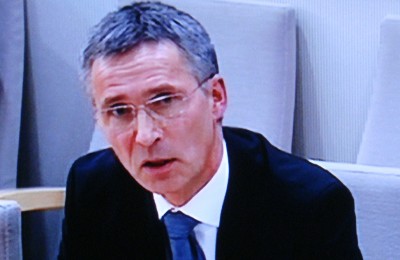Members of Parliament wrote history in Norway on Tuesday when they collectively criticized Prime Minister Jens Stoltenberg’s government coalition for failing to head off or adequately respond to the terrorist attacks of July 22, 2011. Even the government parties, including Labour, scolded Norway’s political leadership for being unable to protect the Norwegian people.

The criticism stopped short of invoking the equivalent of impeachment proceedings. With national elections looming in September, any change of government right now would have been “meaningless,” in the words of one former prime minister. But the conclusion reached and presented by the parliament’s own committee that has probed the government’s response to the July 22 attacks was clear: Prime Minister Jens Stoltenberg, who already has apologized to the parliament, was the target of an historic rebuke.
It was considered historic because even the parties making up the government coalition that Stoltenberg leads (his own Labour Party, the Socialist Left (SV) and the Center Party) went along with the harsh criticism. That’s unusual and Labour MP Jette Christensen said it was a difficult thing to do, but necessary: “When this is read 30 years from now, it’s important that we all agreed on how history is being written here.”
Hallgeir Langeland, an MP from the government party SV, called the situation “special,” because “we in the government parties propose that a unified Storting (parliament) accepts this criticism against the government.”
He noted, though, that he thinks Norway’s police intelligence unit PST (Politiets sikkerhetstjeneste) is responsible for the “most serious weakness” in events leading up to the attacks. “PST in my opinion lived with a threat picture from the Cold War” well into the years after 2000, putting most of its efforts into surveillance of left-wing organizations and not the right-wing extremist circles where the July 22 terrorist was active. Langeland also claimed PST has a “dangerous” culture of not admitting mistakes, which he thinks must be changed.
Stoltenberg is left taking the brunt of the criticism, with his justice minister, Grete Faremo, expected to improve security and preparedness in Norway. Leading opposition parties including the Conservatives (Høyre), the Progress Party (Fremskrittspartiet) and the Liberals (Venstre) expressed dismay that Stoltenberg can continue as prime minister.
Others, like the Christian Democrats (Kristelig Folkeparti) and the government parties were milder in their criticism and Kåre Willoch, a former prime minister from Høyre, told newspaper Dagsavisen that it would be “meaningless” for the parliament to formally express a lack of confidence (mistillitsforslag) at this point. “Installing a new government that would only sit for a few months before the next government is elected would not be favourable for society,” Willoch told Dagsavisen.
Views and News from Norway/Nina Berglund
Please support our news service. Readers in Norway can use our donor account. Our international readers can click on our “Donate” button:

